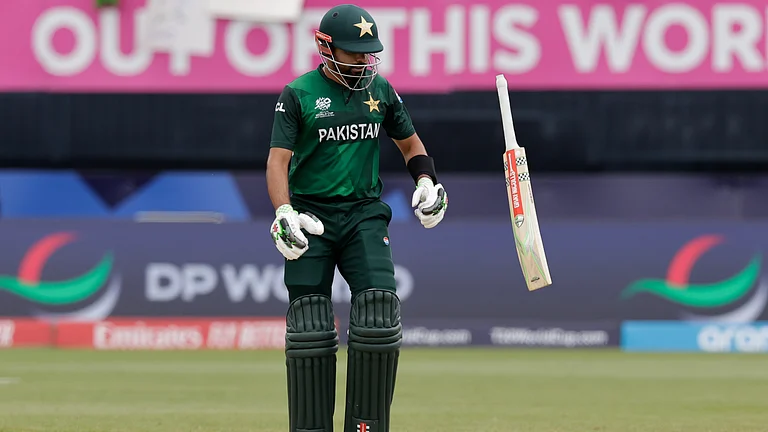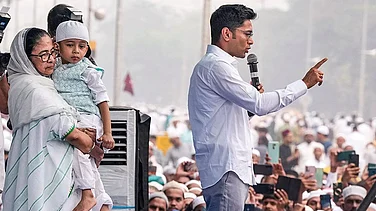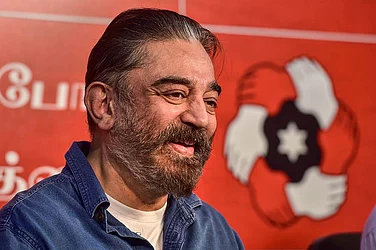ModiSpeak
the noises the PM hopeful makes
“It is of great concern to me when Pakistani soldiers come into our territory and cut off our soldiers’ heads.”
“How many traders, how much FDI is coming from Italy? In how many cities are people from Italy putting up shops? How many Italians get jobs in India?”
“Imperialists in Pakistan are running a campaign for Akhand Bharat, so that Pakistan, India and Bangladesh can become one and this can be a Muslim majority country.”
“Even China has started challenging us on our borders. This is not because our soldiers are weak, but because of problems in Delhi.”
“Both of us have foreign neighbours. The difference is, here you are troubled by Bangladesh and there, Pakistan is troubled by me.”
“As the chief minister of a border state I will be the first to come face-to-face with Mian Musharraf.”
“Mian Musharraf’s language is borrowed from the Congress. Both are saying the same thing.”
“Eent ka jawab patthar se dena hoga. Terrorism can be uprooted if the government has the will and courage.”
“Isn’t it strange that Pakistan, which has engineered so much bloodshed in Kashmir and forced its Hindus out, should try to teach me lessons in communal harmony?”
“From here (Bhuj in Gujarat) my voice reaches Pakistan first before it can be heard in other parts of India.”
***
Irony isn’t among the Sangh parivar’s strengths, but it shouldn’t escape notice that the only Congress leader singled out for praise bordering on reverence by the BJP is the man who, as India’s first home minister, banned the RSS and put its leaders in jail. Yet Sardar Patel continues to be idolised and coopted by the BJP with unbridled enthusiasm. It is Patel’s image that matters most in the BJP’s iconography. Patel the great unifier, instrumental in incorporating the 560 princely states into the Union. Patel the decisive leader, the ‘Iron Man’, in contrast to Nehru, whose ‘woolly-headed’ approach led to Pakistan and China waging war against India.
If L.K. Advani was marked out as Patel Mark-II all this while, in BJP 2.0 Narendra Modi has eclipsed him as ‘Chhote Sardar’. The BJP’s prime ministerial candidate for the 2014 polls wants to give Patel his due by building a structure that is ‘taller than the Statue of Liberty’. Like the original, Modi fancies himself as the tough and decisive leader the country so badly needs, in contrast to you-know-who. So far, Modi’s bellicose, militaristic worldview was in the realm of the precept, the thigh-slapping and muscle-flexing noted with concern and no small amusement. But with the BJP going for the jugular and placing Modi one step away from 7, Race Course Road, analysts and geopolitical experts are parsing every word of his to understand just what it would mean to deal with an India under Modi.
“The rise of Narendra Modi is seen with as much apprehension in Pakistan as you guys in India see Hafiz Saeed,” Pakistani political commentator Beena Sarwar said during a recent visit to India. Comparing a three-time chief minister with LeT boss and the mastermind of the 26/11 attack predictably evoked strong reactions. However, the remarks also indicated the unease with which many in Pakistan look at dealing with India under Modi’s leadership.
There are two sides to his image that Modi has purposively crafted over the years. The first is of a leader who will not make any compromise on terrorism or security issues. The second is to project himself as a ‘market-friendly’ and ‘pro-business’ leader whose development model has worked wonders for Gujarat. By implication, it means that if elected, Modi would extend his policies and change the face of India.
It is Modi’s ‘pro-business’ face that has encouraged many in the west, particularly key members of the European Union. The British, for instance, have reached out to him, breaking the embargo they had imposed after the Gujarat riots on doing business with the CM. But what is of concern to many, both in India and elsewhere, is how being ‘tough’ and ‘decisive’ would play out when he deals with security issues, and therefore, with Pakistan and China.
Significantly, the Chinese are not too worried about dealing with a Modi-led India. As chief minister of Gujarat, Modi has visited China thrice and seems to have been impressed with its economic progress. Critics would say the authoritarian instincts match too. Anyway, there are no major security issues to worry China as it feels that under Modi, India will maintain its equidistance between China and the US, and not try to grow closer to one at the expense of the other. Rather, some Beijing analysts are of the view that economic and trade ties would flourish better under the BJP leader. “Modi’s pro-market philosophy is likely to add new momentum to the growing economic and trade ties between China and India,” says Hu Shisheng, director of South Asia and Southeast Asia Studies of the Beijing-based Chinese Institute for Contemporary International Relations. Even so, the response of a prospective Modi regime to, say, a border incursion would be interesting to watch.
Most experts feel India’s biggest challenge under Modi will come from how he deals with Pakistan. Since their independence, the two countries have fought four wars, in addition to dealing with prolonged phases of rising tension along the LoC dividing Kashmir. A terrorist attack on India’s Parliament had brought the two countries on the verge of a war and in the wake of 26/11, an armed confrontation was averted only through India’s mature and skilful diplomatic handling of a volatile situation, where it needed to show aggression without escalating things—a delicate feat that Pranab Mukherjee as foreign minister could pull off. Given that Modi has always sought to differentiate himself precisely on the basis of his willingness and ability to ‘give a befitting reply’ and other such warlike posturings, the question is what use he would have for anything short of a military option. And if he discovers a flair for diplomacy in tough situations, how exactly would that make him any different from his predecessors?
Beyond that, there is the prickly issue of real acceptability in world capitals. “There is serious concern about what Modi means for India and regional politics,” says well-known Pakistani security analyst Ayesha Siddiqa. She says most people in her country know Modi as the perpetrator of the anti-Muslim riots in Gujarat and through his subsequent anti-Pakistani rhetoric. Ever since the media glare was first trained on him during the riots of 2002, Modi’s supporters as well as detractors have strengthened his ‘anti-Muslim’ image. His frequent jibes at Muslims as ‘Mian Musharraf’, accusing them, by extension, of working as Pakistan’s fifth columnists, have added to his image as a Muslim-baiter. And Modi’s resolve to fight terrorists is delivered with such unrelenting braggadocio that his most fervent admirers possibly expect all terror attacks to cease the moment he takes charge.
“Pakistan won’t dare attack India if Modi becomes PM,” says his BJP colleague Rajiv Pratap Rudy, voicing the blind faith many supporters repose in him. Others wonder what New Delhi’s reaction would be if radical elements in Pakistan, particularly those trying to undermine a bilateral bonhomie, launch a terror attack against India when Modi is in power.
A terror attack from Pakistan will pose a serious challenge for any Indian leader. But for Modi, who hasn’t missed an opportunity to pillory the UPA government for going ‘soft’ on Pakistan and terrorism, it would be even harder to resist the challenge of walking the talk. Does that mean a military strike on terror camps across the border becomes inevitable? Or, by opting to rely only on diplomatic pressure, can he let others have a chance of throwing ‘soft’ at him? At any rate, this won’t be a pleasant dilemma for either the subject or the onlooker.
“How do you think Pakistan will react if India goes for a military strike in response to a terrorist attack?” asks Siddiqa. Most experts like her feel that in such a scenario a Pakistani government would come under tremendous pressure from hardliners to match the Indian response, which can start another war, with a clear threat of a nuclear conflagration. If that happens, it will not only vitiate the region but will also have a global impact. A war is ruinously expensive; it could cripple India. More importantly, extremists who fulminate at civilian governments in Pakistan would gain the confidence that if they need to destabilise the regime in Islamabad, the best way to do so would be by launching a terror attack against India.
“Heightened tension between India and Pakistan is not only bad for the two countries, but for all of us in the region,” says a Bangladeshi diplomat. But is war and confrontation with Pakistan the only outcome if Modi comes to power? Pakistani author and commentator Zahid Hussain definitely does not think so. “Let us remember Indo-Pakistan ties had seen their best when a military dictator ruled Pakistan and a Hindu right-wing party was in power in India,” he says. Similarly, Pakistani political analyst Amir Maaten argues that Pakistanis’ attitude towards India is unlikely to undergo any sudden change simply if Modi comes to power. “It is the policy towards Pakistan that will define India and not the person in charge,” says Maaten.
If his first election rally at Haryana’s Rewari on Sunday was any indication, then it was clear that even Modi was trying to play down his ‘anti-Pakistan’ rhetoric. Though he mentioned Pakistan, it was to stress how the neighbour could develop its own economy if it joined hands with India in its fight against poverty, illiteracy and malnutrition.
But surely, Pakistan is not going to be the only challenge for Modi. The world’s most powerful country, the United States, still has a travel ban in place for Modi that continues to censure the Gujarat chief minister’s role in the 2002 riots. However, there are clear signs that the US could well review that decision and lift the ban if Modi does get to be the prime minister. “This would reflect respect for India’s democratic system more than any statement about the man or any judgement of his past actions,” says Daniel Markey, senior fellow for South Asia at Washington’s Council on Foreign Relations.
Even in the UK, where Modi has been invited by the parliament, there are bound to be strong protests if he does show up. Shruti Kapila, history fellow of Corpus Christi College, Cambridge, asks why such a figure should join a list of guests that includes Mandela and the Dalai Lama. “This recognition by parliament can only help provide international credibility to a man who is undoubtedly controversial and divisive.”
So, by all indications, Modi’s victory could well be hailed by market leaders, big corporate houses and foreign investors, but the possibility of strong economic and business ties may not be enough to burnish his image in many countries. “Modi’s election would have the potential to alter the American perspective of India, but this time for the worse,” says Markey. “My concern is that he would bring back older images of India—like communal violence and Hindu chauvinism—not to mention old debates over human rights, Kashmir and poverty.” It all comes down to this. Modi has zealously hewed close to a very identifiable hard line on many of these geopolitical controversies over the years. Now that his brand is inextricably linked to this image of ‘strength and purpose’, he would find it hard to shake it off, even if he’s elected PM with overwhelming support. The past, Modi might find, is difficult to disown.
By Pranay Sharma with Ashish Kumar Sen in Washington and Saptarshi Ray in London






















